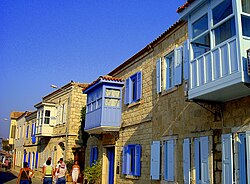Alacati
| Alaçatı | |
|---|---|
| Town | |

A street in Alaçatı
|
|
 Location of Alaçatı within Turkey. |
|
| Country |
|
| Region | Aegean |
| Province | İzmir |
| Elevation | 16 m (52 ft) |
| Time zone | EET (UTC+2) |
| • Summer (DST) | EEST (UTC+3) |
| Postal code | 35xxx |
| Area code(s) | (+90) 232 |
| Licence plate | 35 |
| Website | www.alacati.bel.tr |
Alaçatı (also known as Alatsata, from Greek "Αλάτσατα") is an Aegean town on the western coast of İzmir Province in Turkey, which has been famous for its architecture, vineyards and windmills for over 150 years. It has now made its name in the world of windsurfing and kitesurfing, with its crystal clear water, consistent and steady wind and well-acclaimed hospitality. Alacati is one of the most authentic towns in Turkey with stone houses, narrow streets, boutique hotels and restaurants with tables on the streets. Alacati has a great nightlife, where the nightclubs by the seaside are open until morning. The area is also home to the Alacati yacht marina and the famous Port Alacati development, created by the French architect Francois Spoerry and his son, Yves Spoerry.
There are numerous stories about the formation of the name of Alaçatı. Some resources claim that the old town was called 'Agrilia', and some resources claim, however, the name Alaca At (Red Horse in Turkish) used for the whole area. Their claim is based on a story, that the ruler of Alaçatı had a red horse to ride. When riding the horse, bystanders would refer to him as "Alacaatlı (the man with the red horse)", in time the name was somehow changed to Alaçatı. Some resources claim that the name "Ala çatı" (Iridescent Roof) derives from strong winds causing laundries to fly away and land on neighbour houses. According to some Greek sources, the name Alatsata comes from the Greek word alas (άλας) meaning salt. The region was named because of the nearby salt lakes.
During the exchange of populations between Greece and Turkey, Muslim refugees from Greece were settled here, and ever since then the name Alaçatı has been adopted both for the town and the harbour area. The harbour area was the export port of İzmir until World War II. After the war, the harbour's use declined, and the bay, in which the harbour was, is now popular among windsurfers. The town also hosts a lap of the world tournament of windsurfing, famously called PWA.
Alaçatı became an Ottoman town in the 14th century, according to some; in the 15th century, according to others. Regardless of the date, Alaçatı was originally settled by Greeks in the 17th century. The Muslim population was 132 out of a population of 13,845 in 1895. After the defeat of the Ottomans in the Balkan Wars, Ottoman Muslim refugees fled to the western coast of Anatolia. The Greek population of Alaçatı was forced to leave in 1914 and the village was emptied. Most of the Greek returned in 1919 during Greek administration of Smyrna (1919-1922) when the Hellenic Army occupied the region of Izmir. The majority fled hastily with the retreating Greek Army following Greece's defeat in the Greco-Turkish War, whilst others fled from the shores of Smyrna. The forced emigration of the Greek population, already at an advanced stage, was transformed into a population exchange backed by international legal guarantees.
...
Wikipedia
